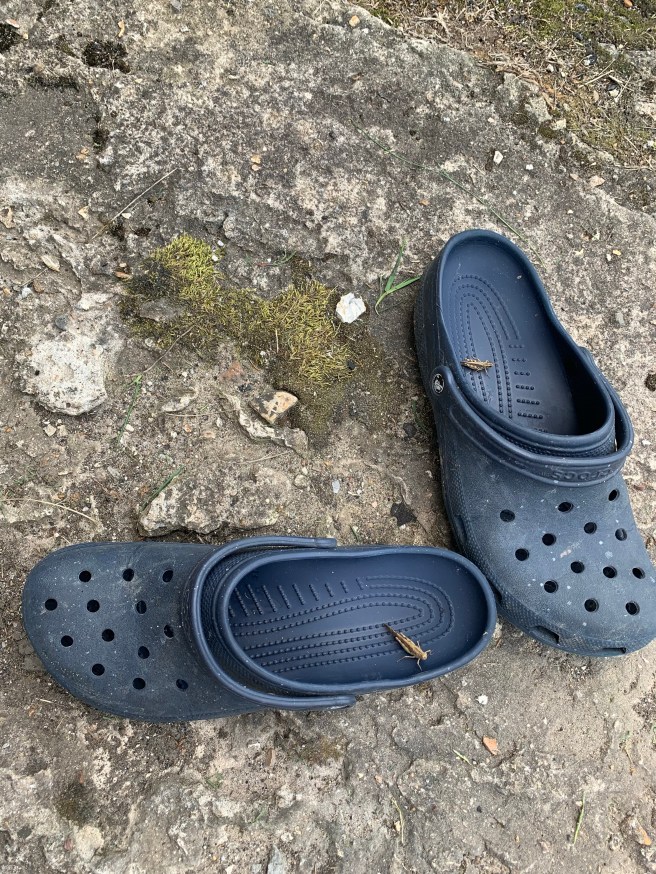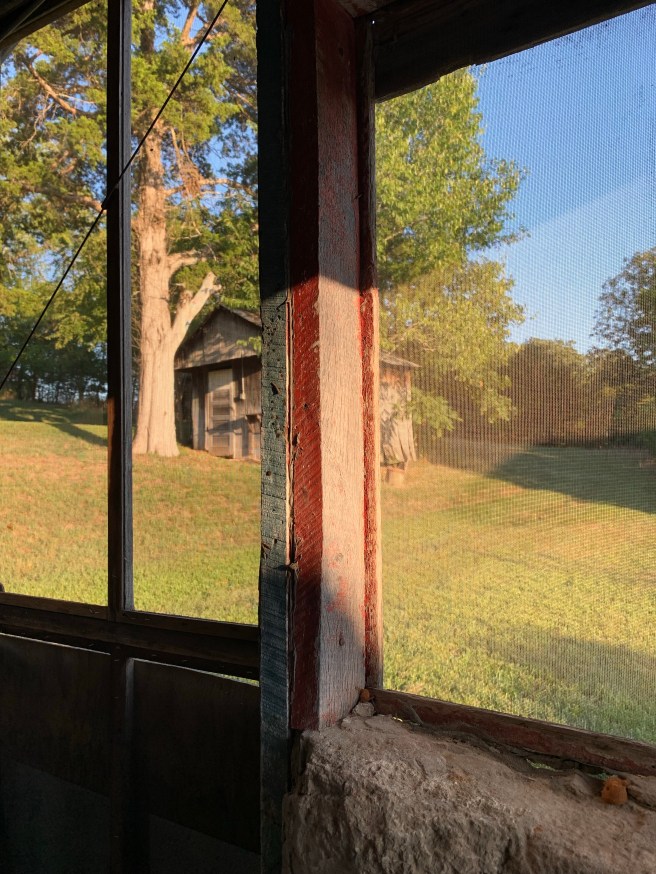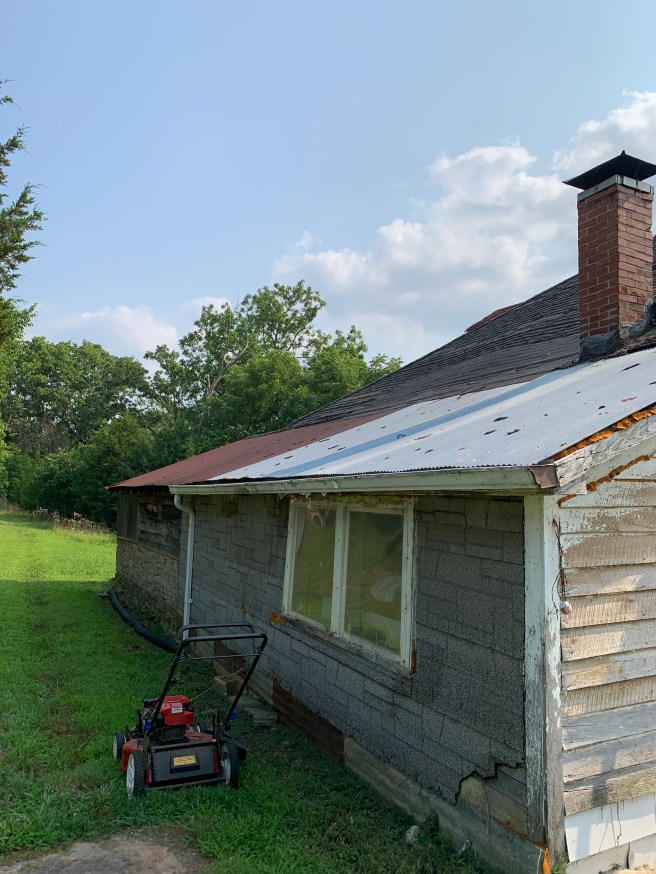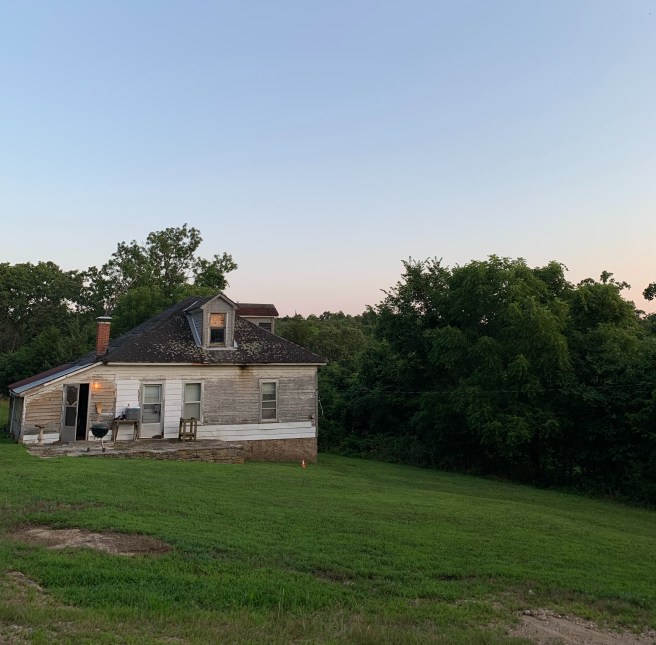I’m out at Farm, flush in the middle of Missouri. Cattle country, rolling hills, September. Lots of walnuts fallen to the ground this year. Hard green stones dropped from tree limbs. And grasshoppers, springing every which way as I walk, as I mow, self-trampolining.
There are fewer of the rusty orange paper wasps, so maybe it worked—targeting the young, emergent queens at first sight in April and May. But I’ve still had to pepper a few with the spray because one of two active nests nestled just within the outer walls of the house sits right behind a crack in a board where I was on the ladder doing work on the roof’s rotted north edge. Aggressive wasps and ladder work don’t mix.
The blue mud daubers, which make no nests for themselves but gather in formidable naked hives to sleep under the soffits, remain active this second day of September, flying sorties, returning to various cracks and gaps in the clapboard house with little balls of mud in their teeth, tracing tiny paths through splintered board and soffit to where they’re constructing mud mangers for their progeny not only behind the exterior walls of the house but also by hundreds in the surface-of-Mars attic.
In those newly built nests the mud dauber females will lay eggs and pack the mud nests with paralyzed, zombified spiders for the next generation to nosh on when they awaken next spring. The blue mud daubers inspect me, they fly right around me. Even when I am adding new wood patches to the rotting fascia and soffit, blocking their preferred pathways to the attic, the blue mud daubers do not attack me. They leave me alone, and I them.
The house flies have returned. They are back in the house, in the car. Drawn perhaps to the scent of suntan lotion, of banana skin. Even when I am outside on the ladder they land on me, they seem to be supping my sweat. They must like the salt. They’re annoying but not nearly as bad; not nearly as plentiful as they were in June and in July when they were in the far back reaches of the house, landing on me as I slept, keeping me from precious sleep.

It’s a warm, dry day. The ground here is hard; these arid times make the upper crust seem even more like a fortress, less penetrable than ever. Like diamond, like concrete, like bone. There was just a touch of coolness this morning, just a hint.
Or maybe I was dreaming. The grass was very dewy, so too the car. But as the morning progresses, the dew lifts, its exit like a ghosting. The moisture falls in the night but it never touches the ground. By the early afternoon the dew is a distant memory, something I might have imagined, a slick apparition of waking. Falling drowned into sleep, waking unto the wet of morning.
Clifty came by last night. In an old white Dodge pickup, wearing a white t-shirt and camo pants, baseball reliever mustache. Friendly as always. I wasn’t sure who it was pulling up the drive because I forgot about that white Dodge Ram, associating him instead with one of his other trucks, a green Nissan, much newer.
So I didn’t wave; didn’t even acknowledge him immediately, keeping a steely demeanor, even a cold shoulder as I was reluctant to leave off the push mowing I had just begun.
But I let my guard down when I realized it was him. The once-young man whose country sent him to the jungles of Vietnam when he was only seventeen years old. Hailing from a lineage of Yoakums that homesteaded land only a little ways from here, just across the county line, a short flight for a crow.
Clifty is now a two-time cancer survivor. Hodgkins years back that he had treated, which went away. Then last year in the depths of the COVID-19 pandemic he went in for a routine scan and the doctors found a lump on his lung. I only saw him once last year. He had part of his lung removed; the cutting laid him low, leaving him short of breath even though they said it wouldn’t.
After he left I thought about the jungle; thought about Agent Orange. He’ll go hunting for pheasant again this year in North Dakota. Just last night he had come by the Farm working out his hunting dogs, among them a dog named Roy who I’ve gotten to know just a little bit. But I wasn’t around, not just yet, and Clifty noted the absence. One day later and I had the chance to visit with him again. Clifty was alone, no Roy—but I’m happy with the compromise. A month or so from now he’ll raise a gun to the fine pheasants of North Dakota, none of them here to speak of, only the odd quail, the random covey.
I’ve been doing work on the roof’s edge for half the day, perched on the old wooden ladder I drag from out of the machine shed. Ladder work taxes my feet, my calves, and, because I’m reaching above my head, I’m also feeling the strain in my shoulders and the small of my back. I’m tearing off sections of rotted wood that served as the roof’s edge—the drip edge—right under the last of the shingles. Rotten, broken, hanging on barely, looking bad, decayed. The first of the fascia but not the last.
Soffit under that, parallel to the ground, the forlorn eaves. Also rotted in spots, and which I’ve previously patched in a few places using some thin wood paneling. Fact is, I thought that paneling was pressure-treated, exterior grade. But it’s not. I don’t know where I got that idea but I was mistaken. So I’m trying to do a little better.
I’d planned this work as a fall or a winter project but the spots are plumb at the front of the house, not hidden away like they might be at the back of the house. I stand out on the front stoop and I look at the decaying, broken sags of wood and they call to me. The grass being as dewy as it is at this point of the morning I can’t get on it to mow, anyway.
I got the ladder out, and then reached for a saw and a square which I brought from home in an old bookbag with a broken zipper. Then I foraged in the machine shed for odd-and-end pieces of lumber which I could use to fashion a new drip edge, and to put a firmer patch on the rotted parts of fascia. Not all of these new patch pieces are pressure treated but some are; and the ones that aren’t seem a bit more solid to me. They’ll buy more time.

I cooked a steak last night on the charcoal grill. I wish I could write about how good it was; whether I cooked it to the mid-rare temp I had in mind when I packed it in the cooler. But I seem to have lost the memory of cooking and eating the steak altogether. Lost it to alcohol, to THC, to nicotine, to exhaustion.
For all I know, some coyotes carried that steak away. I looked for the remains of it in the cooler, under the dome of the grill, in the unplugged fridge. No sign of it. But, I insisted, there must be some gristle, an outer band of fat placed safely in the bag of trash I have hanging in the kitchen? No, nothing there. I kick myself, not being able to remember what must have been a satisfying steak. I do recall first cooking down and wonderfully caramelizing an onion and a few cloves of garlic in butter and olive oil in a cast iron skillet placed directly on the grill (the Helm method). But where’s the beef? I don’t know; the memory ends early.
Hours after the roof edge work. Once the dew dried and I ate some lunch I turned to mowing. And the day went down hill from there. Cognoscenti, that proper mix of fuel and air. Me, dumb in the balance, rolling forward in faint of the spark.
I’ve been waylaid and wrecked by engine problems. First with the push mower and then with the weed eater.
When the mower crapped out I had no choice but to put my expanding yet rudimentary understanding of lawn mower engines to the test. I took the fuel line off; then I took the air filter off. Used wrenches, sockets, my drill, various screwdrivers, and then some of Garvin Lee’s tools out of the old toolbox of his that now resides on the back porch. I took a carburetor apart for the second time in my life. It was completely made of plastic but it was also clean as a whistle.

Truth is, I asked a push mower to do the job of a tractor and I probably deserved the lousy result I got. Have you ever seen a mowing crew using push mowers to hack through tall, weedy grass on the side of the highway? Of course not. Who would do that? Me. But I tried it, and I failed.
My quagmire was the back pasture, which Carmack had cut with a tractor and heavy mowing gear about a month back. (Carmack is the farmer who leases the pasture for grazing cattle.) I was trying to put a finishing touch on that field, with visions of us camping there in the fall. But in chasing that vision I might have irreparably damaged my plastic-parts Toro in the process. A push mower can cut a lawn if the lawn is already a lawn. A push mower cannot turn a pasture into a lawn.
Lesson learned? Maybe, but the reason I even tried it is that I had mowed back there just this past spring, albeit with my other mower, the heavier, sturdier, yellow Poulan—what I realize now is a tougher machine, the front wheels of which I’d worn out mowing up and down this place this year and last.
Front wheels on self-propel lawn mowers are grooved on the inside so as to work like gears with a pinyon that sits inside them, producing the self-propel feature common in many modern mowers, a big help to me here when I’m pushing the mower up one of the several hills around the house. When the teeth inside the Poulan’s front wheels started to be worn out from overuse, I tried to order new wheels but the only ones I could find were on backorder. So I brought the newer Toro out here, and it was working just fine until today.

Another night falls on Farm. I’m in the back of the house on the bed. It’s warm back here. The weather app said tonight would be “good sleeping weather,” but I scoff at that prognostication. It’s not cooled off inside much at all. I’ve got a box fan going. It’s been a long day. I’ll leave tomorrow morning. I’m sitting here thinking about a few things I want to do before I leave.
Get the persimmon photo. Spade the poison ivy volunteer growing on the rock. Sweep the floors. Turn the water off. Put the box fan away. Lopper that rash of unidentified tree yearlings sprouting like thumbs in the otherwise grassy pasture.
Soffit fascia majesty. On a ladder for hours. Breaking off old wood. Cutting it, sawing it, breathing its dust. Making square the breaks. A mish-mash of substitute pieces, reclaimed from the scrap heap in the shed. Measure, size, cut, fit, sand, and screw.
Ad hoc carpenter. More like a butcher. I’d like the roof edge repairs to look good but I’m just buying time and time doesn’t have to be pretty, it’s just got to tick.
Mower fail, weed eater fail, now my pen is sputtering?
Just to be clean as I lie here, to be solar-showered, to be free of the deet and dirt sheeny grime is a small accomplishment after going to bed dirty and drunk last night.
Oh, I had my wits about me as I cooked on the grill tonight. I cooked a score of shallots and garlic in oil and butter before adding two farmers’ market pork chops to the skillet. They were worth remembering.
Last night I woke in a panic, in a slur, searching for that forgotten steak, anxiety spreading in my mind like a crack in a windshield. What the hell did I do with that steak? Did I eat all of it? Even the gristle, like John Candy in The Great Outdoors? Was there no gristle? Was it that good of a NY strip? The old 96er?

But then a second Yoakum brother paid a visit. This was Junior, the youngest, veteran of the Navy, pulling up the drive in an all-terrain buggy with his wife Ginger in the passenger seat and two hunting dogs in tow.
I had never met Jr before. He lives not far away. We got to talking. He had some questions for me. He wanted to know about the house. Does it have running water? Yes, I said, but the toilet is not currently hooked up. Is there any air conditioning, a window unit? asked Ginger. Negative on that. Just a box fan, I said.
Jr remarked on the brush clearing I’ve been doing these last several years. He even noted how the shed had been cleaned up, part of it anyway. He had memories of Willy Lee, Garvin’s father, who lived in the house with Nora in the middle of the last century, who farmed this land. Jr identified that big hulk of rusting metal in the pasture near the barn as an old wheat thresher. My mom’s dad was an old-time wheat farmer. Recently I read an article outlining the history of their threshing circle in the Okawville Times. I wondered about growing wheat on this rocky terrain but I guess ole Willy Lee had it figured out.
As I was chatting with Jr and Ginger, the hunting dogs were scrounging about the yard. One of them found something of particular interest in the grass and was chowing down. This was in the yard about halfway from the stoop to the brushline, along a trajectory by which it is custom practice to launch food scraps from the stoop in an attempt to land them in the brush.
I thought about my aching right shoulder and I could imagine that some portion of the ghost steak must have landed out there last night in the dark, a beacon let loose into the future, available to the first animal, wild or domestic, with the senses sharp enough to find it.
